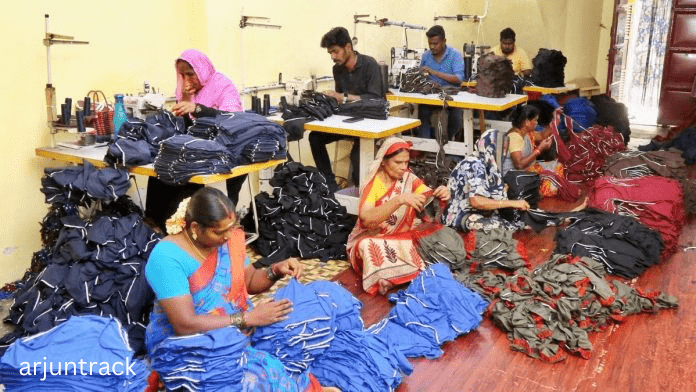30 Lakh Jobs at Risk: Trump Tariffs Threaten Tamil Nadu’s US-Bound Textile Exports
Trump’s new tariffs on textile imports from India have put Tamil Nadu’s export-driven textile sector at risk. Nearly "30 lakh jobs" may be affected as the state faces reduced demand from the US market.
30 Lakh Jobs at Risk: How Trump’s Tariffs Are Choking Tamil Nadu’s US-Bound Textile Exports
The textile industry in Tamil Nadu, often hailed as the backbone of India’s knitwear exports, is facing an unprecedented crisis. US President Donald Trump’s imposition of steep tariffs on Indian goods has sent shockwaves through the region’s apparel manufacturing hubs, putting nearly 30 lakh jobs and 20,000 factories at risk. Tiruppur, often dubbed the knitwear capital of India, is particularly vulnerable as a majority of its exports are US-bound.
The ripple effects of these tariffs not only threaten the livelihoods of millions but also risk destabilizing one of India’s most significant export sectors.
The Heart of India’s Knitwear Exports
Tiruppur and its surrounding areas form the epicenter of India’s knitwear industry. With approximately 2,500 exporters and over 20,000 standalone units, this cluster contributes a staggering 68% of India’s knitwear exports. Last year alone, the turnover crossed Rs 44,744 crore, showcasing phenomenal growth despite challenges such as the COVID-19 lockdown and the geopolitical tensions stemming from the Russia-Ukraine crisis.
Approximately 40% of Tiruppur’s textile exports are destined for the United States, with Europe and the UK constituting another 50%.
business
This heavy dependence on the US market explains why the recent tariffs imposed by Trump have sent immediate tremors through the industry.
Why the Tariffs Are a Blow to Tamil Nadu
The tariff hike from an existing 25% to a potential 50% has made it extremely difficult for manufacturers. Fabrics for core products such as undergarments, baby suits, and sleepwear are exported to the US at razor-thin profit margins, making it impossible for manufacturers to absorb the increased costs.
Many exporters have already been instructed by American buyers to ship out all goods ready before August 27th while some portion of the tariff burden is being absorbed by manufacturers.
However, with the prospect of an additional 25% tariff looming, orders have now been put on hold indefinitely.
Kumar Duraisamy, Joint Secretary of the Tiruppur Exporters Association, emphasized the severity of the situation: “No one can absorb such a blow. It has severely impacted cash flows, halted shipments, and disrupted the supply chain.”
The Human Impact: Millions of Jobs at Stake
Chief Minister M.K. Stalin has sounded the alarm, describing the situation as a potential humanitarian and economic crisis. According to the CM, Tamil Nadu alone employs nearly 75 lakh people in the textile sector.
With tariffs threatening to reduce exports drastically, nearly 30 lakh jobs are estimated to be directly at immediate risk.
This is not just a loss of numbers but a potential blow to countless families who depend on the textile industry for their livelihoods.
The textile sector in Tamil Nadu predominantly consists of small- and medium-sized enterprises employing a wide range of skilled and unskilled workers. The tariff-induced crisis threatens to destabilize this delicate socio-economic ecosystem.
Government Response and Calls for Intervention
Recognizing the gravity of the situation, Tamil Nadu’s Chief Minister has urgently appealed to Prime Minister Narendra Modi to take swift measures.
His recommendations include fixing the GST on man-made fibers at a reduced rate of 5%, removing duties on cotton imports, extending easy low-interest loans with moratorium benefits, and enhancing export incentives and credit facilities to help manufacturers withstand the crisis.
This coordination between state and central governments aims to provide immediate relief and implement structural reforms to boost export competitiveness.
If addressed promptly, it could help the textile industry survive this difficult period and regain its growth trajectory.
Broader Implications for India-US Trade Relations
Tamil Nadu’s textile crisis sheds light on the broader impact of trade policies under President Trump’s administration toward India.
With US tariffs threatening multiple sectors including textiles, leather, auto parts, and machinery, several Indian states find themselves disproportionately affected due to their trade ties with the US.
India exported $433.6 billion worth of goods last financial year, with 20% destined for the United States.
However, Tamil Nadu alone contributes 31% of its $52.1 billion merchandise exports to the US, making the state’s economy far more exposed to tariff risks than many others.
Industry experts warn that unless tariff barriers are addressed through diplomatic channels or relaxed by the US government, Indian exporters may need to explore alternate markets, diversify product lines, and innovate to reduce costs.
What Lies Ahead for Tamil Nadu’s Textile Industry?
The current crisis presents a defining moment for Tamil Nadu’s textile industry.
Exporters are now forced to rethink their business models and supply chains. Strategic measures could include focusing on non-US markets, investing in quality and innovation to counterbalance tariff effects, and utilizing government schemes aimed at export promotion.
However, these are longer-term solutions that cannot immediately compensate for the financial stress caused by halted orders and increased duties. Immediate steps from policymakers and cooperation from international buyers will be crucial in alleviating the crisis.
Conclusion
The stark reality is that Trump’s tariffs have imperiled an entire ecosystem of knitwear factories, exporters, and workers in Tamil Nadu, putting nearly 30 lakh jobs in jeopardy.
The ripple effects of tariffs choke the flow of US-bound textile exports and threaten to destabilize not just a sector but the broader socio-economic fabric of the region.
